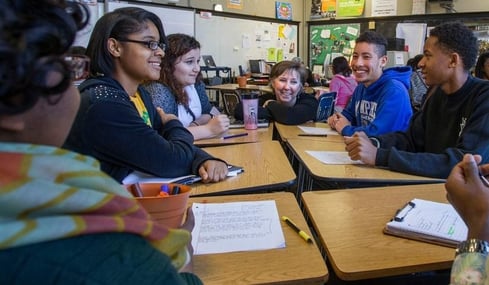When I was in elementary school, I was chosen to read aloud a poem I wrote about Martin Luther King, Jr. It was during a school-wide assembly to celebrate the United States’ Black History Month. I remember reciting my poem and the celebratory feeling in the room. The sense that we were united by the legacy of this wonderful man and our enlightened accomplishments as a racially diverse school community. Even then I understood that my presence onstage was meant to be evidence of that enlightenment and progress.
This is one of the many pleasant memories I had of celebrating Black History Month in elementary school. There were assemblies in the auditorium and art projects in homeroom. During these times I felt important as one of the few African-American students in my classes. I was excited to learn about African-American experiences and contributions, and I knew that there would likely be increased attention to my work. Surely some of my classmates (rightly) resented being singled out for their blackness, but I was perhaps a bit of a ham. I enjoyed the opportunity to shine.
 It wasn’t until I was much older that I began to understand the need to acknowledge that black history - both the uplifting and the incredibly painful parts - was an integral part of the overall history of the United States. While Black History Month continues the necessary job of highlighting the contributions and experiences of African-Americans in this country, it (and other specialized months) should not be seen as a substitute for striving toward a more inclusive and egalitarian national narrative.
It wasn’t until I was much older that I began to understand the need to acknowledge that black history - both the uplifting and the incredibly painful parts - was an integral part of the overall history of the United States. While Black History Month continues the necessary job of highlighting the contributions and experiences of African-Americans in this country, it (and other specialized months) should not be seen as a substitute for striving toward a more inclusive and egalitarian national narrative.
We are part of increasingly interconnected communities. We can’t continue to draw boundaries around the contributions, experiences, and actions of groups. Our choices - and the legacies of those choices - don’t follow the boundaries of calendars or single categories of identity. Certainly this country, through centuries of protest, struggle, and growth, has made amazing strides in acknowledging and writing a more inclusive narrative of its history. This has been done in part by uncovering, amplifying, and reconstructing silenced voices and experiences. We’ve also diversified the voices that write and teach these histories.
Yet we still live in a society where issues of representation and inclusion are painfully relevant. We’ve seen this in the very need for a Black Lives Matter movement and more recently in the controversy over a lack of diversity in the 2016 Oscar nominations. These contemporary examples illustrate that we have not yet arrived at a place where our history, institutions, and public life are genuinely inclusive of the many perspectives, experiences, and identities that inhabit the nation.
So how do we move past the reliance on Black History Month as a catch-all for representation of the experiences, contributions, and voices of African-Americans? Building on the work of activists, teachers, historians, and everyday people, we need to ask why we tell the stories we tell and what impact these stories have on young people. We have to ask who or what is missing when we think our stories are complete. As historians, history educators, textbook writers, and publishers we have to ask questions about our own identities and biases in the histories we create and share. As students of history we have to ask ourselves why we gravitate to stories of certain individuals, groups, and events, and who might be left out of those preferences. And we have to advocate for the inclusion of more voices from diverse backgrounds while deconstructing the ‘norm’ that such diversity is measured against. If we maintain these norms then we further the dynamic where non-normative voices can only be part of our history one month at a time.
How do you break the norm - in the classroom or in your own life - when you face history?
Explore key moments in black history with resources from Facing History and our partners:

